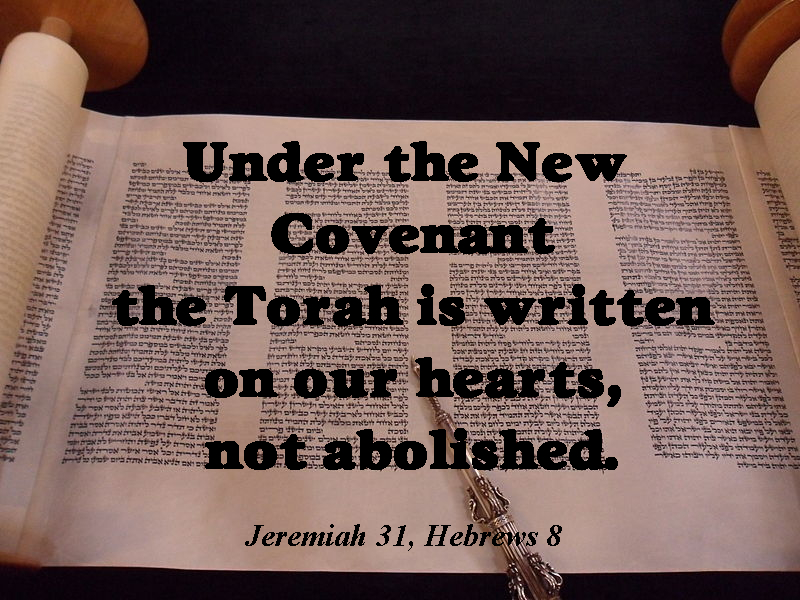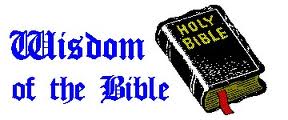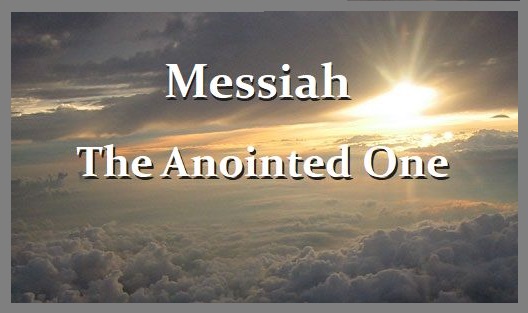In the Bible, the apostle Paul mentions the ‘Law’ of God many times. But what is the Law of God, and why is it important that we understand the blessings that result from our obedience to its precepts?
According to the Scriptures [the Bible], God’s Law is something to delight in, something full of wonders, and it is a perfect and true thing:
I have longed for Your salvation, O LORD; and Your Law is my delight. (Psalm 119:174)
Open my eyes, that I may behold wondrous things out of Your Law. (Psalm 119:18)
The Law of the LORD is perfect, converting the soul…. (Psalm 19:7a)
Your righteousness is an everlasting righteousness, and Your Law is the truth. (Psalm 119:142)
O how I love Your Law! It is my meditation all the day! (Psalm 119:97)
The Scriptures [God’s Word], describes God’s Law as ‘Delightful, Wondrous, Perfect, and True.’ But since there are some today that scorn and criticize God’s Law as something to avoid, we must ask ourselves – How can something that is delightful and wondrous, perfect and true, be bad for us??
As we read the Scriptures, especially in the Psalms and Proverbs, we see that God tells us that obedience to His Law results in our happiness and blessing:
“. . . he that keeps the Law, happy [‘blessed’] is he.” (Prov 29:18b)
So should we ignore and consider as nothing, some of the words in Scripture? I think not!!
Let’s recall what the apostle Paul said:
All Scripture is given by inspiration of God, and is profitable for doctrine, for reproof, for correction, for instruction in righteousness. (2Timothy 3:16)
All Scripture includes the Psalms and Proverbs. So if someone thinks that keeping God’s ‘Law’ is unprofitable, then there is something incorrect in their understanding of the Scriptures.
The key to understanding God’s ‘Law’ is to understand the meaning of the Hebrew word used!!
Our understanding of God’s Word is greatly increased as we look at the Biblical definition of the word ‘Law’.
In the Scriptures, the English word ‘Law’ is most often the Hebrew word ‘Torah’ — which means, “the instructions, teachings, and guidelines” of the LORD God (whose Hebrew name is Yahuwah Elohim).
So, in other words, we could say of Psalm 119:97, “O how I love the instructions, teachings, and guidelines of the LORD God! It is my meditation all the day!”
Also in the Scriptures, the English word ‘perfect’ is often the Hebrew word ‘tamiym‘, which means “entire; truth; without blemish; perfect; undefiled; and upright.”
So when we see the verse that says: The Torah of the LORD is ‘perfect. . .’ (Psalm 19:7a), we could say “The Torah of the LORD is entirely truthful, without blemish, perfect, undefiled, and upright.”
 Now in the same verse, we are told, “The Torah of the LORD (Yahuwah) is perfect, converting the soul.” (Psalm 19:7b)
Now in the same verse, we are told, “The Torah of the LORD (Yahuwah) is perfect, converting the soul.” (Psalm 19:7b)
So we must ask ourselves, how does the Torah ‘convert‘ the soul?
Throughout the Scriptures, the English word ‘convert’ is the Hebrew word ‘shuwb‘, meaning “to return; turn back; turn; turn away or toward; refresh or restore; bring back.”
As we read and meditate on what the verses of Torah (the instructions, teachings, and guidelines of the LORD) actually say, we become aware of Father’s ways, and what He delights in. We begin to have an awareness of what is considered sin, and what is not sin, so that we might avoid sinning! Even the apostle Paul tells us, “By the (study of) Torah is the knowledge (comes the awareness) of (what is) sin” (Romans 3:20b; see also 1John 3:4).
This awareness of what is/is not sin, helps us to walk in a way more fully ‘turned’ toward Him. Thus we can see that it is Father’s instructions that give us the awareness, and it is the Holy Spirit within who gives us the Grace (the ability), to ‘turn’ or ‘return’ more fully to obedience to Father’s Word, as did King David.
King David who wrote many of the Psalms, loved the Word of God with a passion! He loved the instructions, teachings, and guidelines of the LORD God (Yahuwah Elohim)! Do we have such a passion for God’s Word?? — a passion for learning and obeying the ‘Torah’?
King David understood the richness of God’s Word! He had a discerning heart and an accurate perspective regarding God’s Word. Because of David’s love for God’s Word, he received this testimony from God:
… God raised up unto the people of Israel David to be their king; to whom also He gave testimony, and said, I have found David the son of Jesse, a man after My own heart, who shall fulfill all My will. (Acts 13:22)
Thanks to The Computer
To truly understand the Scriptures, we must begin to learn at least some of the meanings of the Hebrew words. This is very possible in this day and age thanks to the computer, the internet, and the Bible software programs that are easily available to most everyone.
For me, a tremendous help in understanding the Scriptures, as well as in my walk with God, has been to use the software program e-sword. Thanks to these modern tools, God is bringing many of His people back, ‘returning’ to the Hebrews roots of the Christian faith; bringing His people out of captivity, and restoring a deeper understanding of, and obedince to, His Word!
The Bible was not written by authors having a western, Greek-oriented mind-set! If our worldview is based on a western, Greek-oriented thinking, then we will not understand many of the verses in the Bible. This kind of mind-set results in believers acquiring many unscriptural practices, which lead into bondage.
The apostle Paul once said that he speaks to them that ‘know the law’ (see Romans 7:1). Paul was referring to the importance of knowing Torah in order to understand his writings. The book of Hebrews is also specifically written to those who know (and understand) Torah.
Both the Old and New Testament writings are written from a worldview that is based on a Middle Eastern language and culture. In order to have a correct understanding of both the Old and New Testament writings, we need to have some understanding of the language of the Hebrew people who penned the Scriptures. Such a worldview does not in any way weaken the authority of the Scriptures, rather it confirms the authority of God’s Word! In fact, we will discover that the Old and New Testament teachings complement one another, and blend together in harmony with one another.
Our Saviour’s Words
As we saw in The Torah: The Key to Unlocking God’s Word, many of our Saviour’s Words point us back to obedience to the teachings and instructions, given ‘from the beginning‘! This means learning and obeying the teachings, instructions, and the commandments within the first five books of the Bible — the Torah!
Jesus Christ (whose Hebrew name is Yahushua Messiah) told us:
45) And he that sees Me, sees Him that sent Me…. 49) For I have not spoken of Myself; but the Father (the LORD God) which sent Me, He gave Me a commandment, what I should say, and what I should speak. 50) And I know that His commandment is life everlasting: whatsoever I speak therefore, even as the Father said unto Me, so I speak. 9) …he that has seen Me has seen the Father. 23) Jesus answered and said unto him, If a man love Me, he will keep My Words: and My Father will love him, and We will come unto him, and make Our abode with him. 24) He that loves Me not, keeps not My sayings: and the Word which you hear is not Mine, but the Father’s which sent Me. (John 12:45,49-50 and John 14:9, 23-24).
Notice Jesus’ conclusion of the Words which He said to the people: the Word which you hear is not Mine, but the Father’s which sent Me. We need to take seriously the Words that Messiah said repeatedly — that the Father SENT Him, to speak on behalf of the Father!
Jesus (Yahushua) was the ambassador for the LORD God! Jesus represented the Father in every way. Jesus was the physical representation of the LORD (Yahuwah): Jesus was the brightness of God’s glory, and the express image of God’s person (see Hebrews 1:1-4).
The above verses, and many others in the Gospels, are full of references to Father’s Word; references to the LORD God’s teachings and instructions within the Torah and exhortations to follow the Torah!
The Purpose of Understanding
Let us recall a few Scriptures from the Psalms and Proverbs:
Blessed are the undefiled in the way, who walk in the Law [the Torah] of the LORD God [Yahuwah Elohim (Psalm 119:1)
Give me understanding, and I shall keep Your Law [the Torah]; yea, I shall observe it with my whole heart. (Psalm 119:34)
And I will delight myself in Your commandments, which I have loved (Psalm 119:47)
Your hands have made me and fashioned me: give me understanding, that I may learn Your commandments. (Psalm 119:73)
Let Your tender mercies come unto me, that I may live: for Your Law [the Torah] is my delight. (Psalm 119:77)
—
The wise in heart will receive commandments: but a prating fool shall fall. (Proverbs 10:8)
The Law [the Torah] of the wise is a fountain of life, to depart from the snares of death. (Proverbs 13:14)
A wise man fears, and departs from evil: but the fool rages, and is confident. (Proverbs 14:16)
Whoso keeps the Law [the Torah] is a wise son: but he that is a companion of riotous men shames his father. (Proverbs 28:7)
Where there is no vision, the people perish: but he that keeps the Law [the Torah], happy is he. (Proverbs 29:18)
Think about what these verses are saying! If we believe that the Bible is the authoritative, true, and fundamentally accurate Word of the Living, Eternal God, then these verses can no longer be ignored! Especially we cannot ignore Psalm 119:34 – Give me understanding, and I shall keep Your Law; yea, I shall observe it with my whole heart.
I will acknowledge that some of the verses in the Scriptures are for me ‘hard to understand’ as the apostle Peter told us (see 2Peter 3:14-16). But the difficulty in my understanding is NOT in the Scriptures, but in my LACK of understanding!!
So in the above verse in Psalm 119:34, we see that the result and the purpose of TRUE understanding is to obey God’s Law — His TORAH — His Instructions! (See also 1Chronicles 22:11-12.)
This gets back to what I said at the start: The Bible is not written by authors with a western, Greek-oriented mind-set. If our worldview is based on a western, Greek-oriented mind-set, then we will not understand many of the verses in the Bible, especially in the New Testament. So in order to truly understand the Scriptures, we must begin to learn at least some of the meanings of the Hebrew words, as well as some of the Greek words.
If you want to go further in your understanding of God’s Word, there are several Hebrew Roots (Messianic) teachers that go into great detail about some of the difficult verses in the New Testament. Here are three that I recommend:
One very helpful video is by EliYah Ministries: The Hebrew Roots of Christianity.
A Father Has Compassion on His Children
Some have erroneously taught that obedience to our Father’s instructions will put us under a curse! But if God’s Law (His Torah) is delightful and wondrous, perfect and true, then how could it possibly be true? – that the loving, merciful Father God would threaten His children with a curse for obeying His instructions? That notion is absurd!
Throughout the Bible we see that it is only the ‘disobedient’ who are under a curse. Those who have not yet acknowledged Messiah to receive His ‘grace for obedience‘ — only those who are trying to be righteous by their own efforts—their own works—these are still under the curse, as the apostle Paul tells us (Romans 3:10).
Once we have been born-again, and become the righteousness of God through faith in Messiah [Jesus Christ], then we are given His “grace for obedience,” a genuine desire and ability to do God’s will:
Jesus answered them and said, My doctrine (teaching) is not Mine, but His who sent Me. If any man will do His will, he shall know of the doctrine (teaching), whether it be of God, or (whether) I speak of Myself. (John 7:16 -17; see also Hebrews 10:16-17)
Our heavenly Father, the LORD God, wants us to learn to do His will, which is to obey His Law, the Torah—so that we can know His doctrine (His teaching).
The LORD God (Yahuwah Elohim) loves His children, and He knows that when His children begin to learn about the Hebrew roots of their faith, then they will begin to have a deeper understanding of what Jesus (Yahushua) meant when He said: “If you continue in My WORD, then you are My disciples indeed; And you shall know the truth, and the truth shall make you free.” (John 8:31-32)
Think about this: Any loving, earthly father would not put a curse on his children who love him, and who are trying their best to honour and obey him!
Our heavenly Father is the same:
Like a father has compassion on his children, so the LORD has compassion on those who fear Him. (Psalm 103:13)
 Let us take to heart one thing that the apostle Paul said, and then begin to search the Scriptures for a better understanding – understanding that is according to God’s Word! (see Psalm 119:169):
Let us take to heart one thing that the apostle Paul said, and then begin to search the Scriptures for a better understanding – understanding that is according to God’s Word! (see Psalm 119:169):
The Law [the Torah] is holy, and the Commandment is holy and righteous and good (Romans 7:12).
So do you see? Not only is the Law [the Torah] of the LORD ‘perfect’ — it is also holy, righteous, and good!!
I would say that The Law of the LORD is Perfect, Converting the Soul — and that is a Blessing!!
—
Related Articles:
- Mysteries and Truths Hidden within the AlephBet
- What Is The Purpose of The Torah?
- 10 Paradigm-Shifting New Testament Verses
- Coming Home – To The Truth of Torah
- Thy Torah is My Delight
- My Path to Torah
- The Word – or The Spirit?
- Obeying Torah is Not About Salvation
- Just The Facts Ma’am: Help For Growing in Grace
- Hebrew vs Greek Thought – approx. 10 minute teaching video
- Do You Love God? – approx. 12 minute teaching video
- A Way That Seems Right: Avoiding the Deceit of Falsehoods
—
















Post a Comment